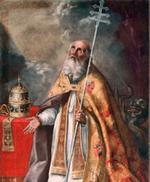Fathers of the Church
Epistle LVII: to Aregius, Bishop of Vapincum
by Gregory the Great in 590-604 | translated by James Barmby, D.d
Gregory to Aregius, Bishop of Gaul.
There being in brotherly love one heart and one soul, as the mind rejoices in the prosperity of another, so is it afflicted in his adversity, since in both it is bound to be partaker by the law of charity. And so the greater sorrow had come upon us for your sadness, lest perchance the affliction of a prolonged grief might batter your heart with continual pain, and burden your life with groans. But, having received the letters of your Charity, we have been consoled with the joy we hoped for, and we give thanks to Almighty God, for that we now know that your equanimity is unimpaired, and that your mind has been restored to comfort. Nor indeed was it otherwise to be expected of you than that you would undoubtedly overcome with priestly patience whatever adversity there might be.
Further, we well recollect how the zeal of your Fraternity flamed up of old in uprooting simoniacal heresy. Wherefore we exhort that you give your earnest attention to this, and that, among other things that we wrote of, it be condemned by the strict definition of a council; that so, the bent of our desire being fulfilled by the help of your solicitude, you may both offer to Almighty. God a most acceptable oblation in the correction of vices, and also shew, for the edification of others, how the care of the pastoral office shines forth in you. Moreover our experience of your life, which we have known to be much superior to that of many, moves us to presume on great assistance from you in this matter. And so complete ye your kindness as under God you have begun, that the good which with a right aim has been begun in you may, by the help of God the Creator of all, be brought to completion.
Furthermore, let your Fraternity bestow your accustomed charity on the monks whom we have sent to our most reverend brother and fellow-bishop Augustine; and so endeavour to succour them for proceeding on their way, as well personally as through others as you can, that, while through your provision they have no difficulties or delays m your parts, both we may feel that our confidence m you was not in vain, and Almighty God may give you the recompense of His grace for the conversion of the souls on whose behalf they have been sent.
Taken from "The Early Church Fathers and Other Works" originally published by Wm. B. Eerdmans Pub. Co. in English in Edinburgh, Scotland, beginning in 1867. (LNPF II/XIII, Schaff and Wace). The digital version is by The Electronic Bible Society, P.O. Box 701356, Dallas, TX 75370, 214-407-WORD.






